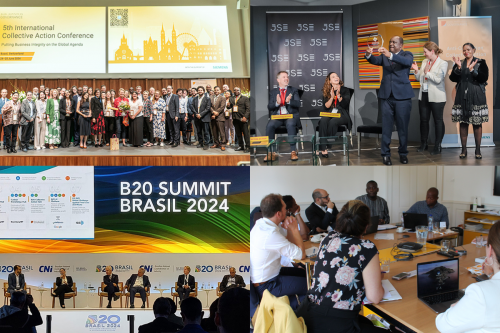Basel Institute Letter of Commitment to UN Global Compact
The Basel Institute has recently published its letter of commitment to the UN Global Compact and its Ten Principles. The Basel Institute has partnered with UNGC since 2013 in support of our shared goal of combating corruption. The letter of commitment is the Basel Institute’s second Communication on Engagement and describes activities and outcomes of our efforts in support of the UN Global Compact Principles, and in particular its tenth principle on corruption, from November 2015 through October 2017.
Below is the full text of the letter.
United Nations Global Compact – Communication on Engagement
Statement of Continued Support
The Basel Institute on Governance is pleased to confirm its commitment to the United Nations Global Compact (UNGC) and its Ten Principles. The Basel Institute is a non-profit organization, think-tank, and Centre of Excellence focused on combating and preventing corruption and recovering stolen assets obtained through corruption in fulfillment of the UNGC’s 10th Principle on Anti-Corruption. The Basel Institute has partnered with the UNGC since 2013 in support of our shared goal of combating corruption. This is the Basel Institute’s second Communication on Engagement and describes activities and outcomes of our efforts in support of the UN Global Compact Principles from November 2015 through October 2017.
Description of Actions and Measurement of Outcomes
The International Centre for Collective Action (ICCA), which is part of the Basel Institute on Governance, won a competitive tender to develop and maintain the B-20 Hub on Anti-Corruption Collective Action in partnership with the UN Global Compact in July 2013. To that end, the ICCA launched a new website www.collective-action.com in June 2014, which it continues to maintain and update. This website serves as a comprehensive, interactive online database, as well as a resource centre for all information on Anti-Corruption Collective Action, including examples of Collective Action initiatives and practical tools and other knowledge products to support Collective Action.
Since October 2015, the Basel Institute and UNGC are collaborating intensively on a joint project sponsored by the Siemens Integrity Initiative entitled: “Scaling up Anti-Corruption Collective Action: B20 Hub on Anti-Corruption Collective Action.” In this context, the Basel Institute is providing expert support to the United Nations Global Compact Office, as well as the local Global Compact networks in Brazil, Japan, Kenya, and Nigeria. The objective of this project is to enhance the knowledge and capacity of these UNGC local networks to promote Collective Action as a tool to generate tangible anticorruption action by businesses in their networks. Most recently, the Basel Institute co-hosted and contributed to a workshop and clinic on Anti-Corruption Collective Action in New York at the Global Compact Offices for local UNGC networks, held on the sidelines of this year’s Global Compact Leaders Summit in New York in September 2017.
Beyond this particular project, the Basel Institute continuously raises awareness of the UN Global Compact as an example of Collective Action at conferences and in its own Collective Action initiatives, as well as the Global Compact principles in the ICCA’s ongoing trainings with the private sector and other actors.
Finally, the Basel Institute has been an active member in the UNGC Local Network Switzerland, for example, through our attendance at the Swiss Global Compact Dialogue 2017, Responsible Business: Let's make Global Goals Local Business, on 2 February 2017. We were also delighted that the Swiss Global Compact Network’s Senior Programme Leader and Network Representative, Mr. Antonio Hautle, attended, alongside other representatives of the United Nations Global Compact Office, our Bi-Annual International Integrity Conference, Anti-Corruption Collective Action: Evidence, Experience, and Impact in October 2016. The Basel Institute remains interested in pursuing further collaboration with the local network as well as the wider membership of UNGC Switzerland. The ICCA also stands ready to provide advice and support to any other local Global Compact Network to support the pursuit of Anti-Corruption Collective Action Initiatives.
While the Basel Institute has not sought to identify how many companies or organizations have joined the Global Compact as a result of our awareness-raising or training activities, we have adopted a detailed monitoring & evaluation plan tracking our activities promoting Collective Action as a tool for preventing corruption and the outcome and impact of these activities. For example, in the last two years, the Basel Institute has conducted over 23 trainings on Anti-Corruption Collective Action, which has resulted in the Basel Institute being appointed to a facilitation role of three new industry-specific Anti-Corruption Collective Action Initiatives.
The Basel Institute remains steadfast in our commitment to contribute to the global fight against corruption and looks forward to continued collaboration with the UN Global Compact and promotion of its Ten Principles in the years to come.
Gretta Fenner Managing Director Basel Institute on Governance



